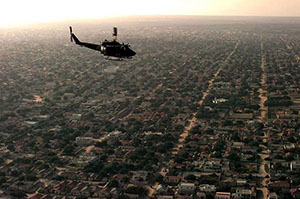 American helicopters were a common sight over Mogadishu, and some rebels learned to shoot them down with rockets. |
President Clinton ordered the capture or death of Aidid, and Aidid responded with increased attacks against American and UN troops. Then, on October 3, 1993, the situation escalated into the Battle of Mogadishu. American Special Forces were supposed to fly into Mogadishu on helicopters, raid one of Aidid's bases, and capture two of his top advisers. But the mission was a disaster: Two helicopters were shot down, and the soldiers had to battle through the night to escape the city.
In the aftermath, Somali fighters took the bodies of two American soldiers and dragged them through the streets of Mogadishu. As images of the soldiers' treatment showed up in American newspapers and on nightly news programs, public opinion turned against American intervention in Somalia. Reacting to those negative feelings, President Clinton withdrew American support for the UN mission in Somalia, even though its mission was far from over.
![By CT Snow from Hsinchu, Taiwan (pictures from an armed convoy trip in Mogadishu) [CC-BY-2.0 (http://creativecommons.org/licenses/by/2.0)], via Wikimedia Commons](https://s3.amazonaws.com/cms.accelerate-ed.com/image/9e7d3dab-ae3d-4e00-8d6c-372acb314151.jpg) The events of the Battle of Mogadishu were dramatized in the movie Black Hawk Down. American soldiers fought through rebels like these, and some of them didn't make it. |
Discuss American involvement in Somalia by answering the following questions:
How might the unpopular conflict in Somalia damage Clinton's presidency?
Was the American mission to Somalia a victory or a defeat?
| Your Responses | Sample Answers |
|---|---|
| At first, people supported the mission to help Somalia's suffering population, but when evidence of American deaths started appearing in the news, some started wondering why Americans were fighting in a far-off country. Clinton's opponents in the next election would be likely to criticize him if a long war erupted, so he simply pulled troops out of the situation. | |
| It was definitely a defeat: The American mission failed, and rebel fighters learned that American troops could be chased from their country. |
